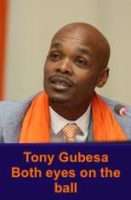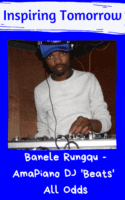For acclaimed poet Hector Kunene, art is a means for his daily bread as much as it is the muscle which keeps his soul intact and his mind sane.
A resident of Hammarsdale township, some 70km outside Durban in KwaZulu-Natal, Hector is a professional poet whose poetic craft has taken him to many places. He has performed in many literary festivals in and around Southern Africa, getting paid for his art.
“It all started in a school newsletter where I submitted my poems. I was in Grade 10 at Bryanston High School in Randburg in Gauteng. It was a white-dominated school and I was a black boy. I remember my classmate and then friend, Andrew Zinn, who for some whatever reason called me Daisy, telling me that my poem had appeared on the school’s newsletter. What a great, exhilarating moment it was!”
The publication of his first poem encouraged him to read extensively and write more poems. He read some well-known poets in the country who among others included Don Materra, Mzwakhe Mbuli, Keorapetse Kgositsile, Lebo Mashile, Gcina Mhlophe, Wally Serote, Lesego Rampolokeng, and Vonani Bila.
He was reared by his maternal great grandmother and his grandfather. Even though his mother was often not around and available for him, he received enormous love and care from the great grandmother and grandfather.
“I shared a bedroom with my great grandmother who was around the age of 80. For some reasons my mother decided to leave me behind when life had her own offerings to her, and my great grandmother really took a great care of me. I loved the street, playing all games you could think of, from ingede (stones), ingqathu (skipping), umagalobhe (jumping on the rope while others are waiting for their turn) to amathini (playing with a ball and tins).”
His great grandmother instilled a sense of respect and some Christian values in him. Even until today, Hector has not moved an inch from all those early childhood values and norms.
He is currently studying full-time towards a Masters degree in drama and theatre at Wits University. He has decided to go back to the class and learn the pedagogy to set himself in a better position as a storyteller in poetry and as an artist.
“I want to be academically inclined for my own good. I am following in the footsteps of Napo Masheane, David wa Mahlaamela, Lesego Rampolokeng, Ntsiki Mazwai and many other poets who decided to go back to the desk while at the peak of their careers.
“The arts always has, always will, pay my bill. I found a way to earn a living as an artist. I work hard, I produce work. I set stages and I invite audiences to come and witness my work, and they consume my creativity which does not come for free. I have broken borders and gotten invites from outside the country, and I go there and make a name for myself. I dish my art in a way that they see a need to invite me again. In this industry, you have to consistently be in people’s minds for them to remember you when they have festivals or shows.”
He cannot be boxed – his audience comprise both the young and the old.
He published his début poetry collection entitled Through the Tunnel some eight years ago. For him, poetry is a style of language he uses to communicate a long story or message in a quick kind of a delivery. It collects a lot within itself – it gives birth to healing, and it exposes prejudices, and unsettles some of those who listen or read it.
“Without passion whatever you fashion will eventually tire your action. I won the Botswana Poetry Slam in 2015 because I have always had a passion. However, I am at the moment staging no new projects until I finish my Master’s degree in three years’ time.”
***
Tell us: What’s the name of a poet that you like and why do you like them?






